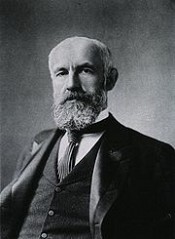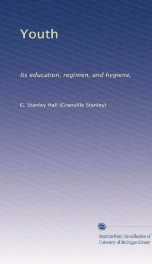Hall G. Stanley

Granville Stanley Hall (February 1, 1844 -- April 24, 1924) was a pioneering American psychologist and educator. His interests focused on childhood development and evolutionary theory. Hall was the first president of the American Psychological Association and the first president of Clark University. Born in Ashfield, Massachusetts, Hall graduated from Williams College in 1867, then studied at the Union Theological Seminary. Inspired by Wilhelm Wundt's Principles of Physiological Psychology, he earned his doctorate in psychology under William James at Harvard University, after which he spent time at Wundt's Leipzig laboratory. He began his career by teaching English and philosophy at Antioch College in Yellow Springs, Ohio. In 1882 (until 1888), he was appointed as a Professor of Psychology and Pedagogics at Johns Hopkins University, and began what is considered to be the first American psychology laboratory.[1] There, Hall objected vehemently to the emphasis on teaching traditional subjects, e.g., Latin, mathematics, science and history, in high school, arguing instead that high school should focus more on the education of adolescents than on preparing students for college. In 1887, he founded the American Journal of Psychology and in 1892 was appointed as the first president of the American Psychological Association.[1] In 1889, he was named the first President of Clark University, a post he filled until 1920. During his 31 years as President, Hall remained intellectually active. He was instrumental in the development of educational psychology, and attempted to determine the effect adolescence has on education. He was also responsible for inviting Sigmund Freud and Carl Jung to visit and deliver lectures in 1909. Darwin's theory of evolution and Ernst Haeckel's recapitulation theory were large influences on Hall's career. These ideas prompted Hall to examine aspects of childhood development in order to learn about the inheritance of behavior. The subjective character of these studies made their validation impossible. His work also delved into controversial portrayals of the differences between women and men, as well as the concept of racial eugenics.[1] Hall was deeply wedded to the German concept of Volk, an anti-individualist and authoritarian romanticism in which the individual is dissolved into a transcendental collective. Hall believed that humans are by nature non-reasoning and instinct driven, requiring a charismatic leader to manipulate their herd instincts for the well-being of society. He predicted that the American emphasis on individual human right and dignity would lead to a fall that he analogized to the sinking of Atlantis. One of the founders of the child study movement, he argued that child development recapitulates his highly racialized conception of the history of human evolutionary development. He characterized pre-adolescent children as savages and therefore rationalized that reasoning was a waste of time with children. He believed that children must simply be led to fear God, love country and develop a strong body. As the child burns out the vestiges of evil in his nature, he needs a good dose of authoritarian discipline, including corporeal punishment. For adolescents, who he believed were characterized by more altruistic natures, high schools should indoctrinate students into selfless ideals of service, patriotism, body culture, military discipline, love of authority, awe of nature and devotion to the state and well being of others. Hall consistently argued against intellectual attainment at all levels of public education. Open discussion and critical opinions were not to be tolerated. Students needed indoctrination to save them from the individualism that was so damaging to the progress of American culture. Hall coined the phrase "storm and stress" with reference to adolescence, taken from the German Sturm und Drang movement. Its three key aspects are conflict with parents, mood disruptions, and risky behavior. As was later the case with the work of Lev Vygotsky and Jean Piaget, public interest in this phrase, as well as with Hall's originating role, faded. Recent research has led to some reconsideration of the phrase and its denotation. In its three aspects, recent evidence supports storm and stress, but only when modified to take into account individual differences and cultural variations. Currently, psychologists do not accept storm and stress as universal, but do acknowledge the possibility in brief passing. Not all adolescents experience storm and stress, but storm and stress is more likely during adolescence than at other ages. Hall had no sympathy for the poor, the sick or those with developmental differences or disabilities. A firm believer in selective breeding and forced sterilization, Hall believed that any respect or charity toward those he viewed as physically, emotionally, or intellectually weak or "defective" simply interfered with the movement of natural selection toward the development of a super-race. Hall's social vision was a socialism of the right, a blueprint for the future German National Socialism that arose just a few years after his death. By the time of his death in 1924, accumulating evidence in biology and anthropology and the influence of John Dewey as well as the growing reluctance of scholars to believe in cosmic history led to the rapid decline of Hall’s influence. Hall's major books were Adolescence (1904) and Aspects of Child Life and Education (1921). Hall also coined the technical words describing types of tickling: knismesis, or feather-like tickling; and gargalesis, for the harder, laughter inducing type. An important contributor to educational literature, and a leading authority in that field, he founded and was editor of the American Journal of Psychology and edited also the Pedagogical Seminary (after 1892), the American Journal of Religious Psychology and Education (after 1904), and the Journal of Race Development (after 1910). Among his books are: Consult G. E. Partridge, Genetic Philosophy of Education: An Epitome of the Published Writings of G. Stanley Hall (New York, 1912) New International Encyclopedia
do you like this author?
What readers are saying
What do you think? Write your own comment on this book!
write a commentWhat readers are saying
What do you think? Write your own comment on this author!
write a commentBook list

Youth: Its Education, Regimen, and Hygiene
Series:
Unknown
Year:
Unknown
Raiting:
3/5
This volume is produced from digital images created through the University of Michigan University Library's large-scale digitization efforts. The Library seeks to preserve the intellectual content of items in a manner that facilitates and promotes a variety of uses. The digital reformatting process results in an electronic version of the original text that can be both accessed online and used to create new print copies. The Library also understands and values the usefulness of print and makes reprints available to the public whenever possible. This book and hundreds of thousands of others can be found in the HathiTrust, an archive of the digitized collections of many great research libraries. For access to the University of Michigan Library's digital collections, please see http://www.lib.umich.edu and for information about the HathiTrust, please visit http://www.hathitrust.org
Show more
add to favoritesadd In favorites
Book list

Youth: Its Education, Regimen, and Hygiene
Series:
Unknown
Year:
Unknown
Raiting:
3/5
This volume is produced from digital images created through the University of Michigan University Library's large-scale digitization efforts. The Library seeks to preserve the intellectual content of items in a manner that facilitates and promotes a variety of uses. The digital reformatting process results in an electronic version of the original text that can be both accessed online and used to create new print copies. The Library also understands and values the usefulness of print and makes reprints available to the public whenever possible. This book and hundreds of thousands of others can be found in the HathiTrust, an archive of the digitized collections of many great research libraries. For access to the University of Michigan Library's digital collections, please see http://www.lib.umich.edu and for information about the HathiTrust, please visit http://www.hathitrust.org
Show more
add to favoritesadd In favorites
What readers are saying
What do you think? Write your own comment on this author!
write a commentGenre
if you like Hall G. Stanley try:
readers also enjoyed
What readers are saying
What do you think? Write your own comment on this author!
write a commentGenre
if you like Hall G. Stanley try:
readers also enjoyed
Do you want to read a book that interests you? It’s EASY!
Create an account and send a request for reading to other users on the Webpage of the book!

